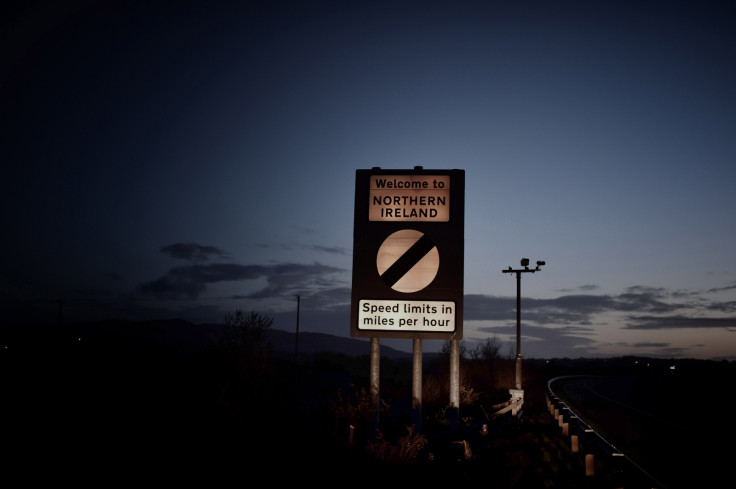How a hard Brexit could endanger Northern Ireland's fragile peace process
The prospect of border controls with the Republic could give succour to dissident republicans.

Northern Ireland, along with Scotland and London, was one of the three regions that voted to Remain in the EU back in June. Some 56% of voters across the province cast a ballot to stay.
That such an emphatic vote on a cross-community basis could be achieved in Northern Ireland – which is still a deeply politically divided and, at times, sectarian society – is nothing short of a miracle. (Welsh voters did what Wales has always done since 1284AD and willingly tagged their destiny to that of their English cousins.)
The last occasion there was such unanimity in Northern Ireland was for the peace accord known as the Good Friday Agreement.
However, since those heady days in 1998 (when Tony Blair intoned he felt 'the hand of history on our shoulder'), Northern Ireland politics have moved to the extremes of both nationalism and unionism. Sinn Fein and the Democratic Unionist Party are now very much in control.
The peace-making parties once led by the two former Nobel Laureates – the SDLP (John Hume) and the Ulster Unionists (David Trimble) – now languish as casualties of the very peace process they created. It is somewhat ironic that these parties now form the official opposition in the Stormont Assembly.
Sinn Fein and the DUP are central to the current stability of Northern Ireland's government, yet found themselves on opposite side during the Referendum debate. Sinn Fein supported Remain whilst the DUP was behind the Leave campaign. A collision course seems now inevitable, especially if Sinn Fein is not to lose face on a matter that was supported overwhelmingly by nationalists.
The Sinn Fein electorate, along with that of the more moderate nationalist SDLP, will not tolerate border controls for goods and people within the island of Ireland. Nor will they accept tariffs on internal trade between Northern Ireland and the Republic. They also want full access to the single market and free movement of labour – unsurprising, given the number of businesses in the agri-food and manufacturing sectors that are so dependent on these key areas.
Theresa May, the British PM, has made it clear that for the UK there will be no regional opt-outs. She is equally adamant that the UK is committed to maintaining the current common travel area between Britain and Ireland, which has existed since 1923.
But this is really a red herring, as the EU formally recognised this bi-lateral arrangement in the 1997 Treaty of Amsterdam.
The Good Friday Agreement was subconsciously premised on both the UK and the Republic of Ireland being members of the EU – and common issues such as sovereignty and identity were both pooled and shared in something greater.
The model propagated during the talks' process was an EU one, based on conflicting identities living peaceably side-by-side and sharing common membership of entities such as the EU. The argument went that if old enemies such as Germany and France could come together, why not unionists and nationalists in Northern Ireland?
Likewise, if Britain and Ireland could work together as EU members, why not conflicting parties in the North who proclaimed allegiances to these respective States?
The Good Friday Agreement envisaged a border-free island of Ireland and a peaceful co-existence within Northern Ireland between the former protagonists of the conflict. The EU recognised this agreement as internationally binding and quickly backed it up with some two billion euros in extra funding.
The unpredictable roulette table that is an Ireland at peace has started spinning once again.
If the Irish and British governments were midwives to the peace process, it was the EU that provided the essential postnatal care.
Now the carefully constructed equilibrium that supports the peace process is under threat. Border regions in Northern Ireland have taken a long time to emerge from their dark and troubled histories.
Despite garrisons of military stationed along the border, it was not the writ of British law that ruled but kangaroo courts run by paramilitaries. Gun-running was the main trade but where borders exist so too do opportunities for profiteering through smuggling fuel, cigarettes and money laundering.
Introduce hard borders and that trade takes off again with most likely the addition of people trafficking. Whilst the IRA ran tight operations, their dissident successors are more criminal and gangster-like in their organisation.
A hard Brexit that may or may not be good for England is almost certainly not good for Northern Ireland. Brexiteers' demands for border controls are incompatible with the concept of light-touch cross-border controls within Ireland, or at Irish exit points north and south.
This is fodder for the recruiting sergeants of the dissident IRA who are eagerly sitting in the wings. It's nearly inconceivable that the burning passions of English nationalism could inadvertently reignite republican paramilitarism – but the possibility remains.
The short-term gains from a collapse in sterling that will lift cross-border retail will have little more than a ripple effect on the rest of the economy with manufacturing, agri-food, tourism, financial services and new creative industries taking the hardest hit. The unpredictable roulette table that is an Ireland at peace has started spinning once again.
Dr Tom Kelly OBE is the CEO of Stakeholder - a public relations and public affairs agency. During the EU referendum he led the cross-community and multi-party campaign in Northern Ireland on behalf of the Stronger in Europe organisation.
© Copyright IBTimes 2025. All rights reserved.






















